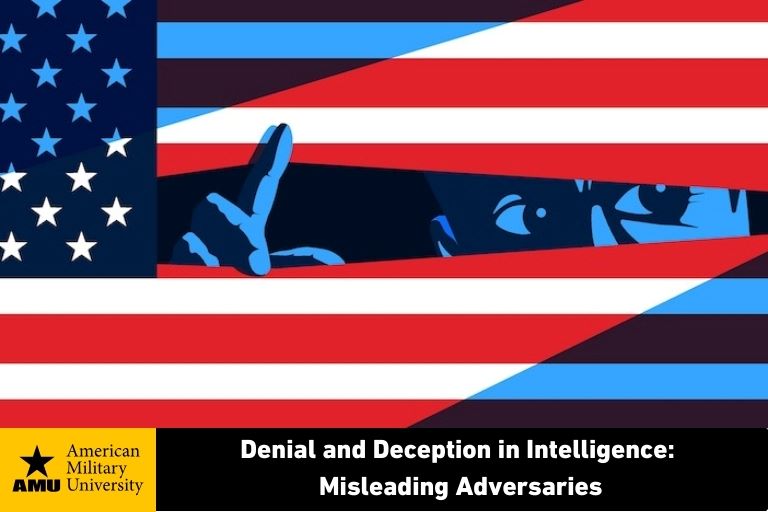By Leslie Doyle | 03/04/2025

During World War II, British intelligence planted false information about Allied operations, and created a situation where that information “fell” into Germany’s hands. As part of this intricate scheme, British intelligence dressed a deceased person as a major in the Royal Marines and placed fake papers on him showing Allied military targets in Greece and Sardinia.
They left the body adrift in Spanish waters where it was likely to fall into the hands of German sympathizers. The ruse worked.
German leaders believed the information in the false documents and responded by moving troops to Greece where they expected the Allied forces would attack next. This deception gave the Allied armies the ability to undertake a surprise invasion of Sicily.
History is replete with instances of denial and deception in military scenarios. The concepts of denial and deception are based around misleading enemies about vulnerabilities, especially during a war.
Denial involves preventing information from reaching adversaries, while deception is purposely giving false information to enemies. Ultimately, the goal of using denial and deception is to impede an enemy's ability to make informed decisions.
Manipulating Information to Outwit Enemies
“Countries use deception to place attention elsewhere, obscure intentions, and hide activities,” says AMU’s Assistant Department Chair of Intelligence Studies Dr. David Kritz. Governments may engage in denial and deception to hide their plans or capabilities from enemies or use the element of surprise to launch an attack.
Foreign governments, threat actors, and terrorists also employ denial and deception. As one example, a terrorist organization may “leak” information that alerts intelligence services to a supposed threat. This misinformation could cause the Intelligence Community to expend military resources in defense against the faux threat.
Modern-Day Deception
The U.S. faces denial and deception campaigns when threat actors use social media to intentionally spread disinformation about candidates for election. These campaigns may be led by state or non-state actors and are propagated by bots instead of humans in some cases.
Conspiracy theories are often part of deception campaigns designed to sow discord. Often, social media accounts for the incredibly swift spreading of misinformation.
“There are two large issues with conspiracy theories," says Dr. Kritz. “First is the speed that misinformation spreads contrasted against the length of time it takes to invalidate the message. Second, society at large has a penchant to continue believing the misinformation, even when faced with objective facts that counter the incorrect information.
“Misinformation erodes trust in institutions, mitigates the wisdom of professionals, and deepens the chasm of ignorance across the masses. Unfortunately, this trend will likely increase as technology advances, such as deepfakes, become more prevalent."
Denial and Deception in Cyber Attacks
Denial and deception go hand in hand with effective cyber attacks. Hackers and other criminals often use campaigns to hide the source of ransomware attacks.
“It is challenging to discern where a cyber attack originated from,” observes Dr. Kritz. “As such, it becomes easier for a country to deny the attack was sponsored by a government institution.”
One of the most notable deception challenges in recent history was the attack on the Colonial Pipeline in 2022. A hacker group called DarkSide infiltrated the Colonial Pipeline's network, stealing data and halting the pipeline's operations. The pipeline paid the hackers a ransom of $4.4 million to regain active control of their own computer systems.
The Russian government issued a denial of involvement. No one has been able to confirm whether DarkSide is sponsored by any foreign governments.
The Denial and Deception Challenge to Intelligence Operations
Deception and denial campaigns challenge intelligence operations by making it difficult to discern fact from fiction. To thwart deception, the Intelligence Community needs robust data collection capabilities to arrive at valid conclusions or objective facts based on the information at hand.
The U.S. Intelligence Community has five major intelligence disciplines that are used for collection opportunities:
- Geospatial intelligence
- Open-source intelligence
- Signals intelligence
- Measurement and signature intelligence
- Human intelligence
“Each of the intelligence disciplines has its own strengths and weaknesses. It’s preferable to use multiple disciplines against a target to ensure validity,” says Dr. Kritz.
Tackling Denial and Deception Challenges
The U.S. Intelligence Community combines training with education to mitigate denial and deception techniques. This work includes developing knowledge of:
- Analytic tradecraft
- Intelligence collection efforts
- Indications and warnings
- Cybersecurity
Having robust intelligence collection capabilities is necessary to aid analysts in addressing questions posed by the U.S. Intelligence Community’s customers. The intelligence must be timely enough for policymakers to make informed decisions.
Intelligence Studies Degrees at American Military University
For adult learners who are interested in studying the Intelligence Community and various forms of intelligence, American Military University (AMU) offers different degrees:
Courses in these degree programs are taught by experienced instructors who are deeply familiar with the Intelligence Community. The courses in these programs feature a wide range of topics such as intelligence collection, intelligence operations, critical analysis, strategic intelligence, and intelligence analysis.
Students also have the option of choosing a concentration to fit their professional goals. The bachelor’s degree offers 12 concentrations, and the master’s degree offers nine concentrations.
For more information on these degrees, visit our intelligence degrees program page.

